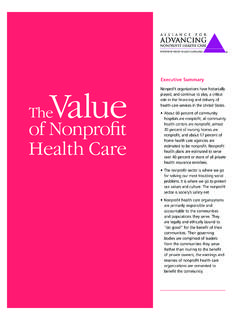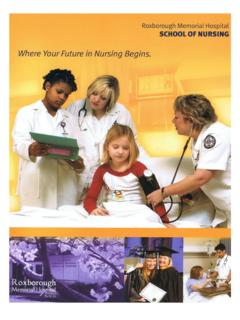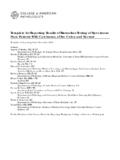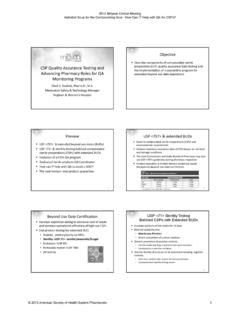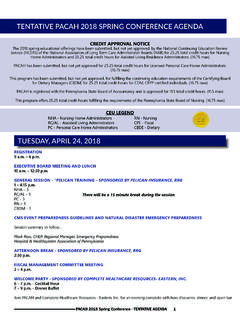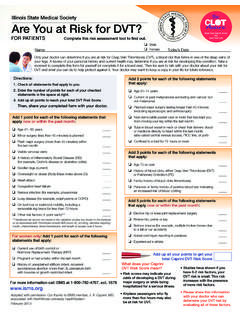Transcription of 04-53 Charity Care Guidelines - Nonprofit Health Care
1 Charity care AND FINANCIAL AID Guidelines FOR PENNSYLVANIA HOSPITALS JULY 2004 Charity care and Financial Aid Guidelines , July 2004 The Hospital & healthsystem Association of Pennsylvania 2 Hospitals and the Uninsured: Statement of the Issue Pennsylvania hospitals and Health systems have a long history of addressing Charity care and financial aid responsibilities through their Health care missions in their communities and compliance with Hill-Burton funding, federal tax-exempt status, Act 55 of 1997 (the Institutions of Purely Public Charity Act), and Act 77 of 2001 (the Tobacco Settlement Act) requirements. Providing Charity care to indigent patients is only one aspect of the current intricate Health care system that includes government funding for some patients (Medicare and Medicaid), private commercial insurance funding for others, and at times, inadequate funding for services even when insurance is available.
2 An ever-increasing number of other patients with no form of insurance to help pay for their hospital care must also be treated. To receive funds for uncompensated care or extraordinary expenses under Act 77, Pennsylvania hospitals and Health systems must provide attestation statements to the Department of Public Welfare on an annual basis affirming the existence of their Charity care program, their efforts to seek collection for all claims, and attempts to obtain Health coverage for patients, particularly the uninsured. As a result, state law requires hospitals and Health systems to continue to carefully review their Charity care policies. In addition, hospitals maintain open admission policies consistent with the requirements for their federal tax-exempt status, and comply with Emergency Medical Treatment and Labor Act (EMTALA) requirements to conduct medical screening exams for individuals that seek emergency treatment and to provide stabilizing medical treatment when an emergency medical condition is identified.
3 Moreover, non-profit hospitals are and have always been mindful of their obligations under their missions and the law governing their tax-exempt status, including the Institutions of Purely Public Charity Act, to provide adequate Charity care and financial assistance. Hospitals and Health systems conduct periodic reviews of their Charity care and financial aid policies to ensure that they are meeting the needs of both the indigent and the uninsured in their communities while at the same time attempting to balance that responsibility with the financial and staffing resources available to meet the various needs of their entire communities. The American Hospital Association (AHA) and the Healthcare Financial Management Association (HFMA) have provided guidance to hospitals and Health systems on Charity care and financial aid policies.
4 The Board of Directors of The Hospital & healthsystem Association of Pennsylvania (HAP) has worked with HAP s CFO Advisory Group, Committee on Public Payor Policy, and Trustee Leadership Steering Committee to develop the following guidance for Pennsylvania hospitals and Health systems. This guidance incorporates national and state-specific guidance. HAP will continue to review these Guidelines , and modify them as necessary, to assist Pennsylvania hospitals in maintaining Charity care and financial aid Guidelines that meet the needs of Commonwealth residents and comply with applicable laws and regulations. Charity care and Financial Aid Guidelines , July 2004 The Hospital & healthsystem Association of Pennsylvania 3 Overall Principles Concern over a hospital bill should never prevent any individual from receiving emergency Health services.
5 Hospitals should communicate this message clearly to prospective patients and to local community service agencies, and make it clear that emergency services will be provided without regard to ability to pay. Hospitals should assist patients in obtaining Health insurance coverage from privately and publicly funded sources whenever appropriate. Hospitals should have Charity care and financial aid policies and practices that are consistent with their missions and values, and with federal and state law, and that take into account each individual s ability to contribute to the cost of his or her care , as well as the hospital s financial ability to provide the care . Financial aid policies should be clear, understandable, and communicated in a manner that is dignified and in languages appropriate to the communities and patients served.
6 These policies should be made readily available to prospective and current patients and to the community at large. Debt collections policies by both hospital staff and external collections agencies should reflect the mission and values of the hospital, and should be monitored carefully to avoid unintended consequences. Current Pennsylvania Requirements Act 77 of 2001 The Tobacco Settlement Act Hospitals must: 1) Submit annual attestation statements to the Department of Public Welfare affirming the existence of their Charity care program, their efforts to seek collection for all claims, and attempts to obtain Health care coverage for patients. Virtually all hospitals in Pennsylvania have complied with this requirement for the past two years. 2) Have a Charity care policy that addresses: Patient eligibility for other public or private coverage.
7 Income eligibility threshold based on family size. Consideration of other resources available to a patient or responsible party. Charity care and Financial Aid Guidelines , July 2004 The Hospital & healthsystem Association of Pennsylvania 4 Patient or responsible party employment status and earning capacity. Other financial obligations of the patient or responsible party. Other sources of funds available to the hospital such as endowments or donations specified for Charity care . 3) Have a plan in place to serve the uninsured and: Accept all individuals, regardless of their ability to pay, for emergency medical screening and for stabilization services, as necessary, within the scope of the hospital s capabilities and capacity. Seek collection of a claim, including collection from an insurer or payment arrangements with the person who is responsible for payment of the care rendered.
8 Attempt to obtain Health care coverage for patients, including assisting patients in applying for Medical Assistance, the Children s Health Insurance Program (CHIP), or the AdultBasic coverage insurance program. Ensure that an emergency admission or treatment is not delayed or denied pending determination of coverage or requirement for prepayment or deposit. Post adequate notice of the availability of medical services and the general obligation of the hospital to provide Charity care . Most of the Tobacco Settlement Act requirements are compatible with the Hill-Burton requirements already in place at many hospitals. Current Pennsylvania Tax-Exemption Requirements Act 55 of 1997 The Institutions of Purely Public Charity Act To qualify for tax-exemption under state law, Pennsylvania hospitals must: Advance a charitable purpose.
9 Donate or render gratuitously a substantial portion of its services. Benefit a substantial and indefinite class of persons who are legitimate subjects of Charity . Relieve the government of some of its burden. Operate entirely free from private profit motive. Charity care and Financial Aid Guidelines , July 2004 The Hospital & healthsystem Association of Pennsylvania 5 Federal Tax Exemption Requirements Federal tax law provides 501(c)(3) tax-exempt status to any organization that is organized and operates for charitable purposes. The provision of Health care services by non-profit hospitals has long been recognized as a charitable activity for this purpose. The community benefit standard established by the IRS in a 1969 revenue ruling continues to be the primary standard applied by the IRS in determining whether hospitals qualify for 501(c)(3) status, even though a number of recent developments suggest that there is some dissatisfaction within the IRS and other parts of the government with the use of the community benefit standard as it is described in that revenue ruling as representing the only requirement for qualification of a hospital as a 501(c)(3) organization.
10 The community benefit standard does not prescribe any minimum Charity care requirement as one of its elements. The 1969 revenue ruling that established the community benefit standard essentially replaced a 1956 revenue ruling in which the IRS had established a financial ability standard as a requirement for 501(c)(3) status. Under the financial ability standard, a hospital had to be operated to the extent of its financial ability for those not able to pay for the services rendered, and not exclusively for those who are able and expected to pay. The 1956 revenue ruling illustrated that the financial ability was somewhat flexible by stating that the fact that a particular hospital s record in providing Charity care was relatively low was not conclusive in showing a failure to meet that standard.
